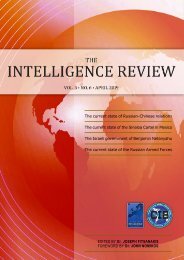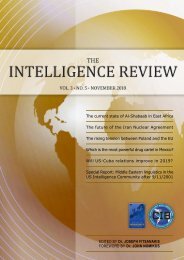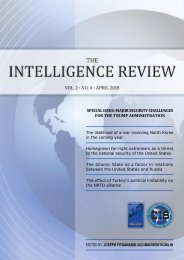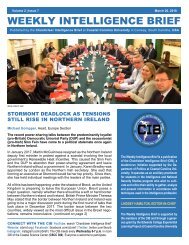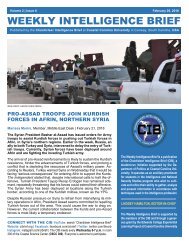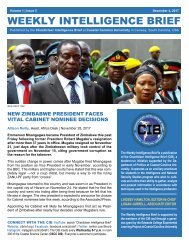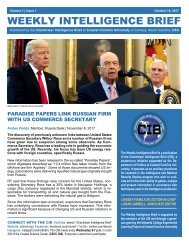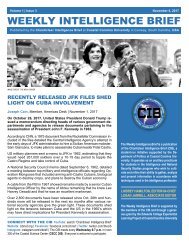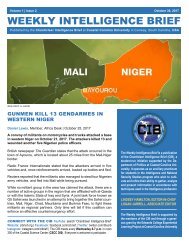The Intelligence Review | volume 5 | issue 9 |
This volume is the product of a transatlantic collaboration between the Chanticleer Intelligence Brief (CIB) and the European Intelligence Academy (EIA), a network of intelligence studies scholars, specialists and students, who are dedicated to promoting collaboration between Europe and the United States in intelligence scholarship and research. As always, the contents of this latest volume of The Intelligence Review are both timely and insightful. Joshua Altman focuses on the relationship between Scandinavia and the North Atlantic Treaty Organization alliance. Jacob Vaughan discusses the future of the presidency of Jair Bolsonaro in Brazil. Hannah Clegg examines the current state of relations between Israel and the Palestinians. Conrad Kodjanian analyzes the evolution and launch prospects of the Chinese digital Yuan. Jake Viator outlines the threats posed to regional stability by the Kata'ib Hezbollah militia in Iran. Ana Maria Lankford discusses the current state of relations between the White House and the United States Intelligence Community. And Jared Gott provides an update on French counter-terrorism efforts in Africa.
This volume is the product of a transatlantic collaboration between the Chanticleer Intelligence Brief (CIB) and the European Intelligence Academy (EIA), a network of intelligence studies scholars, specialists and students, who are dedicated to promoting collaboration between Europe and the United States in intelligence scholarship and research. As always, the contents of this latest volume of The Intelligence Review are both timely and insightful. Joshua Altman focuses on the relationship between Scandinavia and the North Atlantic Treaty Organization alliance. Jacob Vaughan discusses the future of the presidency of Jair Bolsonaro in Brazil. Hannah Clegg examines the current state of relations between Israel and the Palestinians. Conrad Kodjanian analyzes the evolution and launch prospects of the Chinese digital Yuan. Jake Viator outlines the threats posed to regional stability by the Kata'ib Hezbollah militia in Iran. Ana Maria Lankford discusses the current state of relations between the White House and the United States Intelligence Community. And Jared Gott provides an update on French counter-terrorism efforts in Africa.
- TAGS
- wwwcibrieforg
- intel
- yuan
- digital
Create successful ePaper yourself
Turn your PDF publications into a flip-book with our unique Google optimized e-Paper software.
Importance to the United States
The US is a significant actor in Israel-Palestine relations, often
serving as an intermediary. The relationship with Israel serves
as a way for the US to further its agenda in the Middle East,
which revolves around stability, security, and access to energy
resources. The US is Israel’s largest trading partner and annually
provides Israel with over $3 billion in military support. Israel’s
standing in the region, and consistency in promoting US
interests, is largely connected to its relationship with Palestine
as conflicts with its neighbors are often connected to the lack of
a Palestinian state (Zunes 2002).
Position of the United States
Historically, the US has maintained a more lenient position
toward Israel regarding human rights violations, the military
occupation of Palestine, and West Bank settlements compared
to the international community. Past administrations, for
example, referred to West Bank settlements as “illegitimate”
rather than illegal and have continued to provide Israel with
significant defense assistance (Anon. 2017). The Trump
administration, however, was known for its unabashedly pro-
Israel policies. This includes the unprecedented stance that
these settlements do not violate international law and moving
the US embassy to Jerusalem, an area claimed as a capital by
both Israel and Palestine (Borger et al. 2019). Several US
presidents have attempted to negotiate peace deals, most
recently President Trump, which was immediately rejected by
the Palestinians for its alleged pro-Israel approach. The current
US administration of President Joe Biden was expected to take
a more neutral stance. Since his term started, President Biden
has been said to be pressuring Israeli Prime Minister Naftali
Bennett to stop the West Bank settlements, which President
Biden views as a threat to a two-state solution (Ravid 2021).
Recent Developments
Tensions have been on an upward climb for years, most notably
during the administrations of former Israel Prime Minister
37






